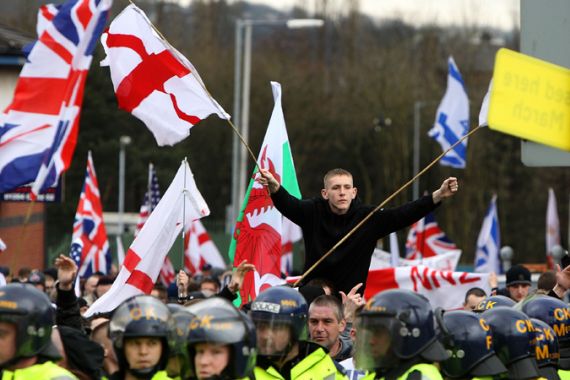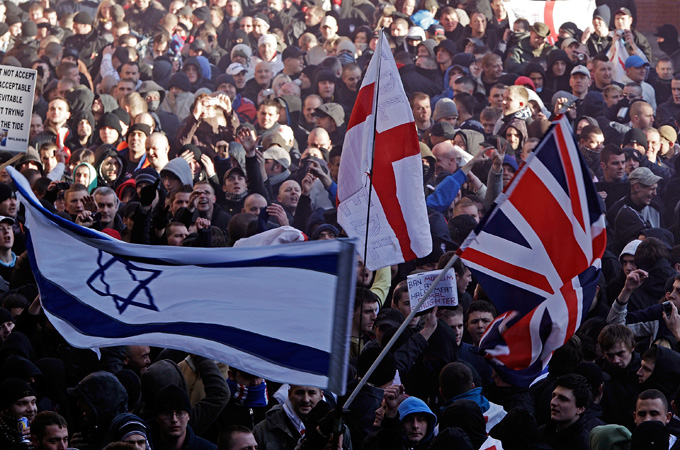JDL and far-right parties find common ground
Extremist Jewish factions and far-right parties team up against “Islamisation” despite the latter’s anti-Semitic past.

 |
| The Israeli and British flags are often flown side-by-side at English Defence League protests [GALLO/GETTY] |
Right-wing movements previously associated with anti-Semitic and neo-Nazi ideologies are increasingly opting for a surprising tactic to garner legitimacy within mainstream politics: Forging alliances with extremist Jewish organisations under the banner of fighting “Islamisation”.
“Far-right parties are professing a new found love of Israel as a way of escaping their past anti-Semitism and racism, and to justify their prejudice towards European Muslims as not being racist,” Toby Archer, a researcher who studies far-right parties and the “counter-jihad blogosphere”, explained to Al Jazeera. “Parties like the British National Party (BNP) in the UK, Vlaams Belang in Belgium, and the National Front in France are all coming out from a neo-fascist past.”
These parties have stopped using anti-Semitic rhetoric, Archer said, which had prevented them from attracting support. It is important to distinguish between the traditional far-right, who are historically anti-Semitic, and the populist new-right, who have emerged in the last two decades and partake in an anti-Muslim discourse, he said.
The English Defence League (EDL) closely linked to the BNP, is a right-wing anti-Islamic extremist group based in the UK. The EDL has gained notoriety for its aggression against British Muslims and its links with neo-Nazi groups. Last year, it moved to garner support within the Jewish community by officially opening a Jewish Division open to “represent the Jews who are fighting against Islamisation,” according to a statement.
Tommy Robinson, a spokesperson for the EDL, said one of the group’s fundamental beliefs was that as a “shining star of democracy”, Israel has the right to defend itself.
|
“Far-right parties are professing a new found love of Israel as a way of escaping their past anti-Semitism and racism, and to justify their prejudice towards European Muslims as not being racist.” – Toby Archer, researcher |
Yet a number of recent demonstrations held by the EDL have continued to be marked by anti-Semitic rhetoric, critics say. In a 2010 demonstration held in Cardiff, EDL members burnt anti-Nazi flags.
BNP leader Nick Griffin has referred to the Holocaust as “the Holohoax” and was convicted in 1998 for distributing material likely to incite racial hatred. He has voiced his support for the EDL and its members. Griffin believes that the EDL is helping politicise young people in the UK. “At least they’re trying to do something,” he said of the EDL. “It’s crude and a bit rough… but we shouldn’t condemn them for being a bit rough and ready…”
Invitation accepted
Signs of lingering anti-Semitism within the UK’s far-right have not stopped the Jewish Defence League (JDL), a group the US Federal Bureau of Investigation considers a “violent extremist organisation”, from eagerly accepting a partnership with the EDL.
In January 2011, JDL Canada organised a rally in support of the EDL. Meir Weinstein, national director of the JDL in Canada, defended its stance, saying the EDL is “taking issue with radical Islam” and supports Israel. Shortly after the rally, mainstream Jewish organisations in Canada publicly distanced themselves from the EDL.
James Clark, an activist with Stop the War Coalition in Canada, has faced the JDL at several rallies. He believes that Jewish groups are shifting towards far-right nationalists, rather than the other way around.
“The JDL has tried to move their politics to the right,” he told Al Jazeera. “They are quite a fringe organisation, but made a bit more respectable by more mainstream Zionist organisations that give them a platform; organisations who support them, but don’t feel safe saying the same thing in public.”
He added that the JDL is obsessed with Muslims and the Muslim community, and preys on the irrational fear that Canada might soon be run by Sharia Law.
The JDL also purports to have significant influence over the Canadian government, who Clark describes as “far and above the US government as Israel’s best friend”.
According to Weinstein, the JDL was able to sway the government from banning George Galloway, a pro-Palestinian British MP, from entering the country in 2009 due to his outspoken sympathies for Hamas.
For Daniel Freeman-Maloy, a Canadian activist and research student at the European Centre for Palestine Studies at Exeter University, the JDL is the product of a larger issue.
|
“[As Jews] we want to exist, and take measures to ensure we do exist… we will ally ourselves with anyone who will fight alongside us against that evil.” – Meir Weinstein, national director of JDL in Canada |
“It is important to highlight that this is not an isolated group”, he told Al Jazeera. “It is a symptom of unapologetic ethno-religious chauvinism that has been left to develop unchecked.”
Weinstein, however, sees it as a fight for survival.
“[As Jews] we want to exist, and take measures to ensure we do exist,” he said. “We take that seriously, and we will ally ourselves with anyone who will fight alongside us against that evil.”
Shaky theological convergence
While the US has been credited with having the most visible pro-Israeli rhetoric, JDL supporters in the US seem to be somewhat different than those in Canada and Europe.
In the past, the US JDL chapter has been linked to a string of bombings against Arab-American targets. It is suspected of carrying out the assassination of Alex Odeh, the regional director of the American-Arab Anti-Discrimination Committee, and the planned attack on Arab-American Congressman Darrell Issa.
Max Blumenthal, a journalist following right-wing movements, believes that the US JDL chapters no longer represent as extreme a viewpoint as they once did, but have now gone mainstream.
At a rally in November 2011, Texas Governor and Christian right representative Rick Perry was seen hugging Dov Hikind, a former leader of the JDL.
For Blumenthal, the alliance between the US right-wing and Jewish extremists is forged on a theological convergence.
“Christians who are sympathetic to the JDL mentality are Christian-Zionists”, he explained. “They are waiting for ‘the Rapture’, and part of the fulfillment is the gathering of all Jews into Biblical Israel, which means the ethnic cleansing of Palestinians.”
Ironically, part of the Rapture mythology is that all non-Christians will perish on that day, including Jews.
The fight for Israel
In Europe, the JDL appears to be expanding. They have recently opened a UK branch (French, German, Swedish, Danish and Austrian chapters are already in existence) and an all-encompassing European umbrella organisation. The JDL Europe’s membership is reported to be around 3,000, with more than 5,000 supporters.
Steven Weigang, founder and chief executive officer of the JDL Europe and the German branch, said the group is “necessary to prevent another holocaust. The anti-Semitism is growing in Europe and we can’t just stand on the side-lines.”
He reaffirmed that JDL Europe shares the views of JDL Canada and its relationship with the EDL, without addressing the EDL’s links to the BNP.
Right-wing groups are gravitating towards the JDL, rather than the other way around, but more in terms of policy towards Israel rather than sharing the same ideology, Weigang said.
“I think the Right in Europe is moving towards sharing our politics”, he said. “The Europeans feel that what is [happening] in Israel [is] on the agenda… I am not sure if they share the same visions as we do. They maybe say it, but they don’t mean it.”
|
“It is necessary to prevent another holocaust. The anti-Semitism is growing in Europe and we can’t just stand on the side-lines.” – Steven Weigang, founder and CEO of JDL Europe |
In France, the JDL has always maintained an active role: It is known for accosting pro-Palestinian rallies, vandalising property, and lobbying the government whenever it perceives pro-Palestinian gestures. In September, the French chapter of the JDL called on its members with military experience to go “defend” the illegal settlements in the occupied West Bank.
Samuel Ghiles Meilhac, a historian who specialises in the French Jewish community, told Al Jazeera that there has been a distinct shift in the community from its previous alignment with the left towards the right.
While representatives of mainstream Jewish organisations are not associated with right-wing parties like the National Front at the moment, Meilhac thinks this could change. In recent years, the National Front has been pandering to Jewish voters by focusing on a “common enemy: the Islamisation of Europe”.
“Most people who are part of the Jewish mainstream in France remember the 1970s and 1980s when the National Front were making jokes about what happened in World War II,” Meilhac said. “But the question is: If the extreme right doesn’t make references to the Jews now, will there still be people in the Jewish mainstream powerful enough to reject them?”
Follow Nour Samaha on Twitter: @Samahanour